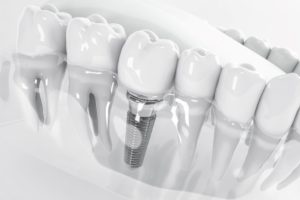
Dental implants are an incredible way to restore your smile after tooth loss because they’re the only option that looks and functions like a natural pearly white. If you travel frequently, however, you may hesitate to get treatment. Many patients figure the recovery time will be too long and will impede their plans, so they put it off. Fortunately, it’s generally safe to travel after dental implant surgery as long as you take the proper precautions. Keep reading to learn more!
Can I Fly Immediately After a Simple Dental Implant Placement?
If you’ve just had dental implant surgery that didn’t require a bone graft or sinus lift, the trauma to your jawbone will be minimal. While it’s recommended to wait a day or two before getting on an airplane, if you are required to travel right away, it’s safe to do so.
Planes have pressurized cabins that likely won’t impact your recovery, but if you just had your procedure that day then you can expect a degree of bleeding and tenderness at the site. It can be challenging to care for yourself properly if you leave town immediately, but if you do, set yourself up for success by bringing plenty of extra gauze with you and taking an aisle seat near the restroom. That way you can get up more easily to rinse your mouth and replace the gauze during your journey.
How Long Should I Wait to Travel After Complex Surgery?
If you’ve had multiple implants inserted, or your restoration required additional work like a bone graft or sinus lift, then you’ll have a longer recovery period before you can travel because the changes in pressure might impact how quickly your mouth heals. In general, you should wait 10-14 days in these cases before you get on a flight.
What Else Do I Need to Know?
If you do have to travel after dental implant surgery, you’ll likely find it helpful to:
- Communicate with the crew. If you have been prescribed a narcotic pain medication like Percocet or Vicodin, let your flight attendant know so they won’t worry if you become drowsy.
- Watch what you eat. Purchase shakes or soups while in the terminal so your belly is full and you’re not tempted by chips, pretzels, or nuts on your flight. Chewing hard foods might injure the surgical site.
- Ice your face. If you’re boarding immediately after your appointment, holding an ice pack to that side of your face can reduce swelling and provide some numbing relief.
If you’re not sure whether it’s okay for you to travel after having dental implants placed, ask your dentist! They’ll give you a recommendation based on your unique circumstances so you know you’re healing safely no matter where you go!
About the Author
Dr. Erin M. Prach takes pride in improving her patients’ lives by enhancing their smiles. She takes a whole-body approach to dental care to reduce the risk of developing additional health conditions. She earned her undergraduate degree at Eastern Washington University before completing her dental degree at the University of Colorado School of Dental Medicine. She then completed a course on oral surgery in Guatemala, so she’s well-versed in placing dental implants. If you’d like a consultation, you’re welcome to request an appointment on the website or by calling (307) 337-4770.
